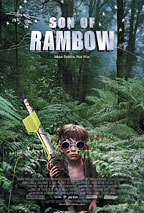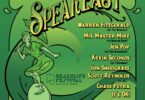
Jennings, who directed and wrote the film, sets up the story by showing the powerlessness of the two main characters. We are first introduced to Will Proudfoot (Bill Milner) the son of an overprotective mother Mary (Jessica Stevenson) that tries to keep him from all semblance of modernity. In fact, during one scene, Will is excused from class because th
The other main character Lee Carter (Will Poulter) comes form a far different place. Under the care of his tyrannical brother Lawrence (Ed Westwick), Lee is a constant target of his brother’s intimidation. As a result, Lee bullies children weaker than himself. Indeed this is how Lee and Will first meet. Will, once again relegated to the hallway, sees Lee being forcefully tossed out of his classroom for misbehavior. When Lee spots the much smaller Will, he immediately bullies him. By using social outcast as leads, Jennings tap into the loneliness and struggle to “fit in” that dominates so many children’s life.
Jennings realizes to tap into nostalgia he cannot dwell on the negative. Therefore, he quickly transitions into more positive childhood memories. When talking about childhood, adults revere the power of a child’s imagination. No one represents the power of imagination than Will. We see this when Will is looking out the window of a car. As the car passes an open field, Will imagines explosions and missiles engulfing the field. Jennings cleverly 
Jennings realizes that nostalgia has an ultimate sweetness to it. Not enough to be overly saccharine just enough to bring a smile and perhaps a misty eye or two. We see such sweetness in the relationship between Will and Lee. Although, they first met because of Lee’s bullying and Will was buffaloed into helping Lee’s movie, over time they became the best of friends and Lee even uses Will’s story, "Son of Rambow", for the movie. Also, after Lee shatters his leg and loses control of his movie, Will finishes the movie and sets up a screening at a movie theater for Lee. This leads Lee to describe this as “the best day of my life” parroting a statement Will made earlier. This type of sweetness along with a nice dose of childhood imagination while still having flawed characters and dramatic tension makes Garth Jennings a master of nostalgia.








hey could u gt me will’s number plz if u could den dat wud b gr8
well luv lil ibbo